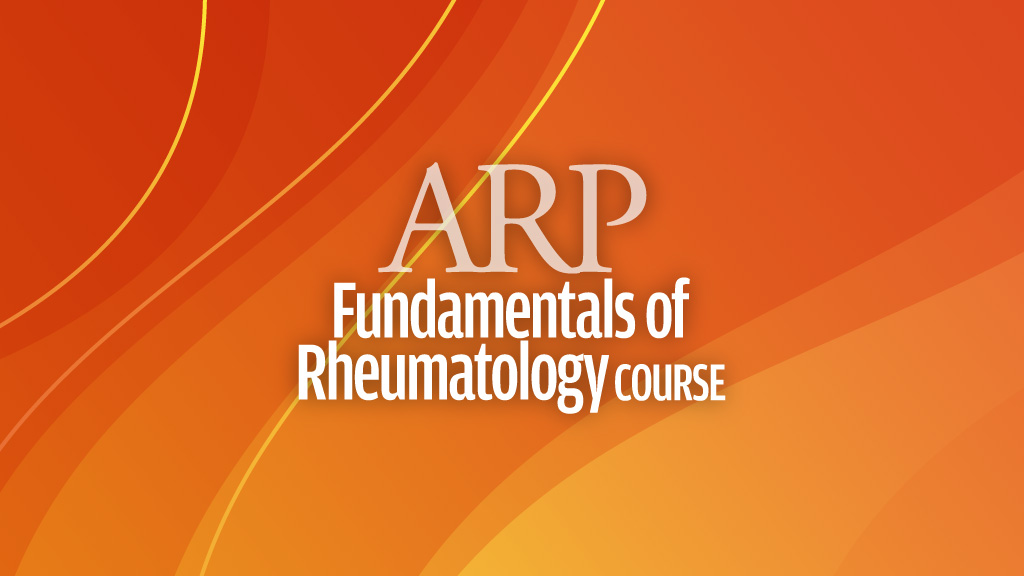
FRC02: Explore Systemic Inflammatory Diseases in Adults and Children
Activity Overview
The Fundamentals of Rheumatology Course is a series of 10 activities that provide foundational knowledge and help develop skills that professionals new to rheumatology need to succeed in clinical practice.
This activity covers the signs, symptoms, and treatments of rheumatoid arthritis (RA), systemic lupus erythematosus (SLE), and spondyloarthropathies in adults and juvenile idiopathic arthritis, (JIA), systemic lupus erythematosus (SLE), and juvenile dermatomyositis (JDM) in children. It addresses key areas such as pain management, psychosocial challenges, rehabilitation, and self-management support strategies.
Fundamentals of Rheumatology Course
This activity is part of a series. See the other activities in the series below.
- Fundamentals of Rheumatology Course - All Activities
- Activity 1 – Discover the Basics: Immunology, Autoimmunity, and Inflammation
- Activity 2 – Explore Systemic Inflammatory Diseases in Adults and Children
- Activity 3 – Differentiate Non-Inflammatory Conditions: Osteoarthritis, Fibromyalgia, and Soft Tissue Disorders
- Activity 4 – Assess your Patient with Rheumatic Disease
- Activity 5 – Address Psychosocial Impact to Enhance Patient Outcomes
- Activity 6 – Counsel your Patient on Rheumatology Medications
- Activity 7 – Help Your Patient Manage Their Pain
- Activity 8 – Use Rehabilitation to Improve Your Patient’s Function, Fatigue, and Pain
- Activity 9 – Stimulate and Support Your Patient’s Self-Management
- Activity 10 – Optimize Care for Your Pediatric Patient
Registration is complimentary for ACR/ARP members. If you are not a member, consider joining ACR/ARP.
Target Audience
Professionals looking to expand their understanding of interdisciplinary rheumatology care: nurses, occupational therapists, office managers and staff, physical therapists, pharmacists, pharmacologists, practice administrators, psychologists, researchers, social workers and community health workers, epidemiologists, health educators, health services researchers, medical assistants, rheumatology interprofessionals, and students.
Experienced professionals may also find the activity to be a helpful review.
Learning Objectives
Upon completion of this activity, participants should be able to:
- Define the three major types of pediatric rheumatic diseases in childhood (JIA, SLE, JDM)
- Identify the signs and symptoms seen in the three major rheumatic diseases of childhood
- Describe initial treatment goals for the three major rheumatic diseases of childhood
- Identify signs and symptoms and other key information about rheumatoid arthritis, systemic lupus erythematosus, and spondyloarthropathies in adults
- Explain the rationale for the use of ancillary studies to diagnose and monitor rheumatic disease activity in adults
- Describe key treatment strategies to manage rheumatic disease in adults
CE & MOC Information
CME
ACCME Accreditation Statement
The American College of Rheumatology is accredited by the Accreditation Council for Continuing Medical Education (ACCME) to provide continuing medical education for physicians. See the ACR's CME Mission Statement. For more information, download the AMA PRA Booklet.AMA Designation Statement
The American College of Rheumatology designates this Enduring Material for a maximum of 1.50 AMA PRA Category 1 Credit(s)™. Physicians should claim only the credit commensurate with the extent of their participation in the activity.
CME credit must be claimed by June 24, 2028, at 11:59 PM ET.
Financial Relationship Disclosures
ACR Disclosure Statement
It is the policy of the American College of Rheumatology (ACR) to ensure that Continuing Medical Education (CME) activities are independent and free of commercial bias. To ensure educational content is objective, balanced, and guarantee content presented is in the best interest of its learners and the public, the ACR requires that everyone in a position to control educational content disclose all financial relationships with ineligible companies within the prior 24 months. An ineligible company is one whose primary business is producing, marketing, selling, re-selling or distributing healthcare products used by or on patients. Examples can be found at accme.org.
In accordance with the ACCME Standards for Integrity and Independence in Accredited Continuing Education, ACR has implemented mechanisms prior to the planning and implementation of this CME activity to identify and mitigate all relevant financial relationships for all individuals in a position to control the content of this CME activity.
Nature of Financial Relationships
All individuals that participate in an ACR-sponsored activity and are able to change content or influence the content of the activity must disclose to the planning committee and audience all financial or other relationships with ineligible companies including, but not limited to:
- Advisor or review panel member
- Consultant
- Employee
- Officer or Board Member
- Grant/research support
- Speaker/honoraria includes speaker’s bureau, symposia, and expert witness
- Independent contractor
- Executive role and/or ownership interest
- Royalties and/or patent beneficiary
- Intellectual property/patents
- Stock options or bond holdings in a for-profit corporation or self-directed pension plan
- Private investigator
- Expert witness
- Equity interest
- Other: specify details
None: Has no relevant financial relationship(s) with ineligible companies to disclose.
All participants that created and/or were able to influence the content and delivery of this activity reported the following disclosures. All of the relevant financial relationships listed have been mitigated. FRC Relaunch 2025 Financial Relationship Disclosures.
Acknowledgement of Commercial Support
No commercial support was provided for this activity.
See industry engagement opportunities and benefits of supporting the ACR.
Educational Activity Policies
See ACR educational activity policies, including the online enduring activity refund policy.